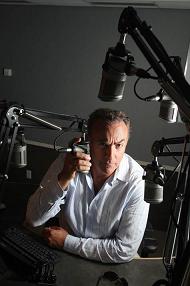I recently returned from a visit to Philadelphia, and on a follow-up conference call with the WMMR management team, the idea of non-traditional dayparts came up. At least that’s what we now call overnights and even nights.
 PD Bill Weston mentioned that his station has a live jock in overnights, the flamboyant up and comer, Jacky Bam Bam (pictured here). And it was a reminder of just how anomalous this is.
PD Bill Weston mentioned that his station has a live jock in overnights, the flamboyant up and comer, Jacky Bam Bam (pictured here). And it was a reminder of just how anomalous this is.
Live overnights?
You’re kidding, right? At a time when fiscal responsibility and budget cutting isn’t just stylish, it’s the norm, why would WMMR spend the money on this unrated daypart?
Because Greater Media corporate, Vice President/Market Manager John Fullam, and Weston are all on the same page when it comes to growing talent. If we don’t provide the training ground and opportunity, we limit the chance that there will be another Preston & Steve on Philly radio.
And that took me back to a session in which I participated at the Canadian Music Week conference nearly two years ago. They gathered a bunch of us from different corners of the industry, dubbed us “radio stimulus czars” and turned us loose to fix the industry.
 I was especially taken by Howard Glassman’s speech (pictured). Known as “Humble Howard” to his legion of fans who have listened to him on Canadian radio for decades, he had a simple and amazing idea that any American station could do to address the challenge of talent development.
I was especially taken by Howard Glassman’s speech (pictured). Known as “Humble Howard” to his legion of fans who have listened to him on Canadian radio for decades, he had a simple and amazing idea that any American station could do to address the challenge of talent development.
Howard called it “The $75 Solution.” The idea is that every station could set aside $75 a week to give a part-timer, up-and-comer, no-name, or wannabe a chance to jock overnights (5 hours x $15/hour). How hard is that?
He noted that Malcolm Gladwell’s Outliers posits that it takes 10,000 hours to master a craft, so how could anyone become a star on the radio given the current set of circumstances that essentially eliminates the farm team?
Every industry has its version of “the minors,” where aspiring talent gets a chance to work out the kinks “off-Broadway” or in less crucial circumstances. Yet, by eliminating overnights, weekends, and even nights from a station’s live schedule, radio talent development for the future is stunted or even quashed.
If I were a Wall Street analyst, I’d be asking broadcasting CEOs about where the next generation of on-air radio stars will come from. How will the industry grow its talent base in an increasingly competitive media environment?
Every business needs a bench, a Plan B, or a AA team.
Radio is no different.
Best of luck to Jacky and his rapidly diminishing fraternity. Whether he earns the opportunity to broadcast during the daytime is anybody’s guess. But I like his odds.
Congrats to Peter Smyth, Buzz Knight, and the WMMR Philly team for investing in its future and radio’s legacy.
So who has $75 in the coffee fund or petty cash drawer, and is willing to take a shot at Humble Howard’s humble suggestion?
Who will say “no” to voicetracking one night a week?
For the future of the industry.
- A 2020 Lesson?It Could All Be Gone In A Flash - April 24, 2025
- How AI Can Give Radio Personalities More…PERSONALITY - April 23, 2025
- Can Radio Afford To Miss The Short Videos Boat? - April 22, 2025




Hey Fred,
A friend turned me on to this post b/c of my links to Philadelphia radio and I hope you permit me to comment.
This would be better if it were the $325 Solution or $525 Solution don’t you think? If you’re going to commit to talent development, then commit to it.
Howard’s solution seems to be more lip service then actual talent development, unless the objective is to give managers an in to hire talent for overnights and start the development process.
How many jocks have you worked with that benefited by being on just one night a week? How many major league baseball players have been successful without playing the game 162 times a season barring injuries.
I also think you may be distorting the situation here where WMMR clearly benefits as much if not more from having Jacky Bam Bam on the air. Jacky is by no means an up-and-comer. He’s been albeit bit player on the Philly radio scene for a long time, and is known to the listeners of the former WYSP and to the patrons of many adult entertainment establishments in South Philly. (Not that there’s anything wrong with that.) So it seems to me that this maybe isn’t the best example you could have used.
I appreciate your enthusiasm for developing young talent, but some would suggest that this ship has sailed a long time ago.
-Ben
Ben, I totally hear you on this issue. And you are correct. That “10,000 Rule” can’t possibly apply to one day a week. But it’s a start, and my hope would be that the result for radio would be positive with this concept, and it could be expanded. It’s an imperfect world, and this is an imperfect solution. But it’s better than what we’re doing now. I also appreciate what you’re saying about Jacky – he’s not an unknown, but what would be his chances in Philly radio if not for MMR’s commitment to be live 24/7? Thanks for your comments, and for taking the time to contribute.
From your lips to Wall Street’s ears, Fred.
🙂 – thanks, Ben.
Hey Fred — I’m a big proponent of putting people in the “minor league” shifts, as you put it, especially since if the industry doesn’t groom talent, it won’t have anyone to call up to the majors later on, to continue the baseball theme. I’m sure I’m not the only person in the industry who can say they got started in overnights once upon a time, making peanuts per hour and running on adrenaline and caffeine.
The only problem I foresee in this scenario is a bit of a sense of entitlement from the people who we’d be tapping to do those overnight shifts. The more I see from Gen Y (or are we into Gen Z now?), they expect to come out of college and score a six-figure income in a cushy job at the top of their fields. Case in point — I remember a thread on Radio-Info’s message boards from 2007 in which a graduating University of Arizona senior proclaimed she was the best DJ on her college’s radio station and asked how could she get a high-paying job either in Tucson or someplace like New York (even at one point saying she would be perfectly suited to jump right in as the PD of KOHT, which had the opening at the time). Six pages of discussion ensued, in which a number of commercial radio pros attempted to convince her that her enthusiasm was great, but she would have to pay her dues, do long shifts and bad work for little pay and start at the bottom — advice which she completely disregarded, telling everyone that the experiences she had as a commercial radio intern should qualify as “abuse”; that she couldn’t understand how, after getting a job as a restaurant manager, her salary would go down after getting a college degree if she went into radio; and how sorry she was that all of these people had such a negative attitude about her potential and maybe that’s what was holding them back from excelling in radio. The full thread is still available for your amusement/horror at https://boards.radio-info.com/smf/index.php?topic=61652.0
I can’t tell what’s a sorrier commentary on the current state of affairs — that someone could make more flipping burgers at In-n-Out than doing a shift in radio, or that someone would rather take that In-n-Out job than have a cool job like being on the radio because they think they’re overqualified to do overnights and that they wouldn’t want to do that shift since it would interfere with their social life. Not that we ought to redo our industry’s entire business model to suit the financial desires of recent college graduates, but if we need to entice young talent into our field, we need to simultaneously manage Gen Y’s expectations while also realizing that the carrot of being on the air can’t be paired with the giant log of miserable pay… though I do recognize and understand the financial constraints that almost every station is under right now. This needs to be an industry-wide push to ensure the future of our business, and the impetus needs to come from the top down.
Keith, always great to hear from you. I concur that Gen Y has a different mindset that Boomers or even Xers on many fronts. But I also believe that just about eveyrone who is now successful in radio (and other fields) made some sacrifices early on, in terms of time, money, personal satisfaction – or all three.
And an industry-wide initiative here would be a wonderful investment in our stations and our brands. If RAMP would like to be a megaphone, let’s work together to get the word out. It does start at the top and I believe there are more CEOs who could be convinced to beta this concept.
As always, appreciate your opinion and your sincere thoughts.
As a school that’s been placing young people in entry-level radio jobs for
42 years (we’re pretty good at it) I thought I’d mention a great relationship
that we began last year with Greater Media-Detroit. Thanks to one of the
truely great PD’s in the country, Brent Alberts, we now supply interns for one of their HD’s called Deep Tracks. We carefully screen current senior students who do regular shows. It’s kind of the 21st Century version of the
weekend/overnight spots that used to exist everywhere. It’s, for now, a great use for these…and zero cost.
use for these
Yet another way to earn those DJ chops. Thanks for sharing, Dick.
Fred, great idea! I know when I started I was willing to work for free for a shot. Just imagine real live radio again. At Zona Rocks most of my Jocks are volunteers which allows to make some programming decisions themselves. Some perks are worth more than cash.
Humble Howard got the room’s attention when he mentioned this. Now how do we make it an industry idea and not just something that happens sproadically? Thanks for chiming in on this.
I think this is a great idea in theory, but I think it’s already anachronistic. I fear that young talent, who in years past would want to go into radio, have already realized that they can simply start up a podcast that will get them more experience, get it faster, reach more people, and – ultimately – earn them more money if they’re successful.
Aaron, you may be right. We may have blown off an entire generation of potential talent who are more interested in working for Groupon, Google, or Pandora. But I believe there is still something enticing, and maybe even romantic, about being on the radio. I would love to put it to the test. Thanks for taking the time to read our blog and offer your thoughts.